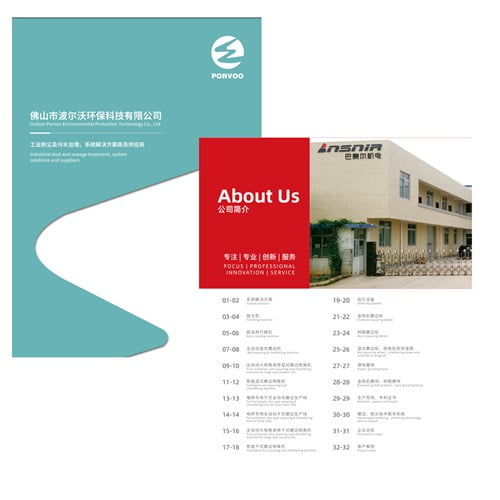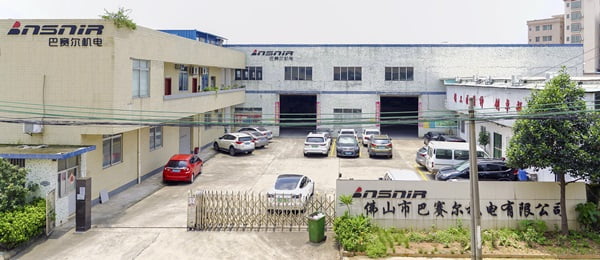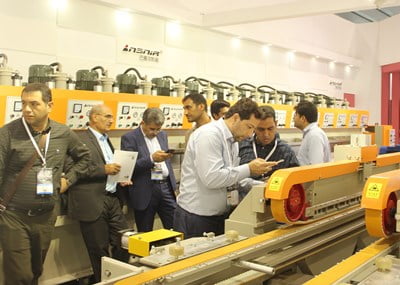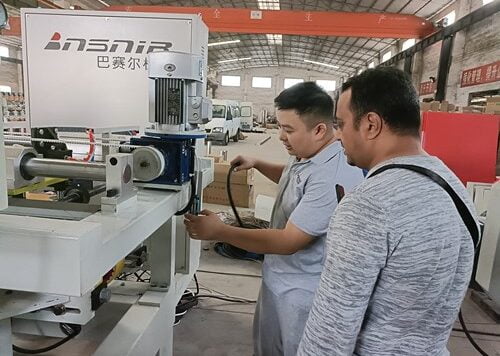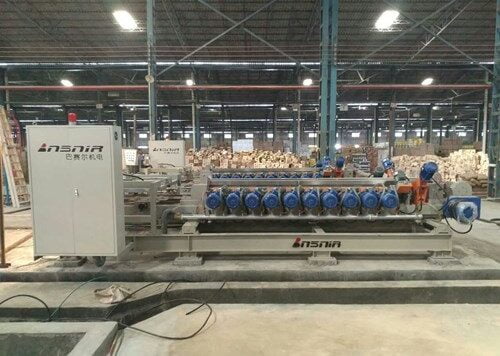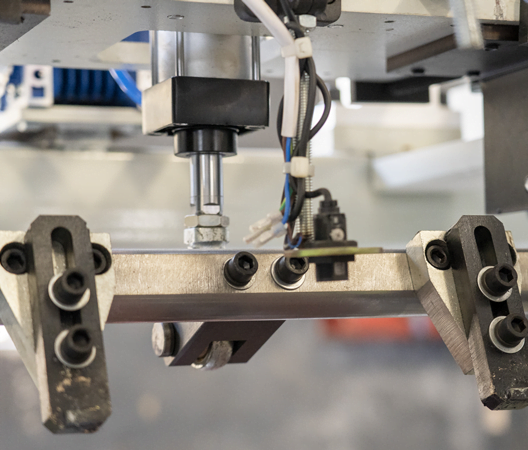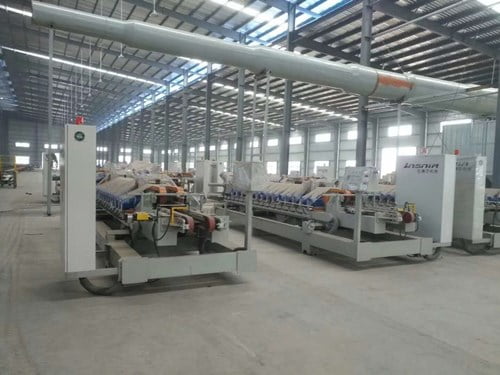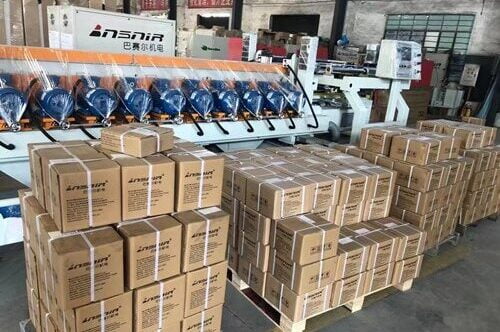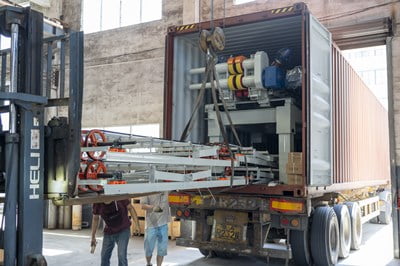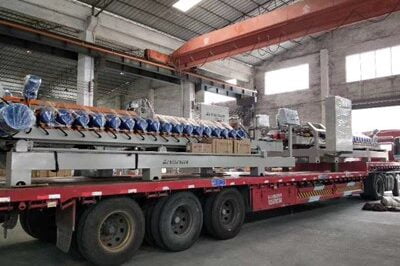The ceramic tile industry has seen significant advancements in manufacturing technology, with squaring machines playing a crucial role in ensuring product quality and consistency. These sophisticated devices are essential for producing tiles with precise dimensions and perfect right angles, meeting the exacting standards of modern construction and design. [ (BASAIR)[basair-tec.com] ] offers cutting-edge solutions in this field, with their squaring machine line showcasing the latest innovations in tile processing technology.
Squaring machines have revolutionized the tile production process, offering unparalleled accuracy and efficiency. They are designed to trim and shape ceramic tiles to exact specifications, eliminating irregularities and ensuring each piece meets stringent quality control standards. This level of precision is not just about aesthetics; it's crucial for proper installation and longevity of tiled surfaces in both residential and commercial applications.
"Squaring machines are the cornerstone of modern ceramic tile production, guaranteeing dimensional accuracy and facilitating seamless installation."
The importance of squaring machines in the ceramic tile manufacturing process cannot be overstated. They not only enhance the quality of the final product but also significantly improve production efficiency, reduce waste, and allow for greater design flexibility. As we delve deeper into the world of ceramic tile squaring machines, we'll explore their functionality, benefits, and the technological advancements that are shaping the future of tile production.
| Feature | Benefit |
|---|---|
| Precision Cutting | Ensures exact tile dimensions |
| Automated Process | Increases production efficiency |
| Multiple Cutting Heads | Allows for various tile sizes |
| Digital Controls | Provides accurate and consistent results |
| Dust Collection System | Improves work environment and product quality |
How do squaring machines achieve such precise cuts?
Squaring machines employ a combination of advanced technologies to achieve incredibly precise cuts. At the heart of these machines are high-speed diamond cutting wheels that rotate at optimal speeds to cleanly trim tile edges. Precision sensors and computerized control systems work in tandem to guide the cutting process, ensuring each tile is perfectly squared.
The process begins with tiles being fed into the machine on a conveyor belt. As they move through, multiple cutting heads work simultaneously to trim all sides of the tile. This multi-head configuration allows for efficient processing of various tile sizes and shapes.
"Advanced squaring machines can achieve tolerances as tight as ±0.1mm, ensuring unparalleled consistency in tile dimensions."
| Cutting Head | Function |
|---|---|
| Primary | Trims two adjacent sides |
| Secondary | Trims remaining two sides |
| Calibration | Fine-tunes dimensions |
What role does automation play in modern squaring machines?
Automation is a key feature of modern squaring machines, significantly enhancing production efficiency and consistency. These systems utilize sophisticated software and sensors to continuously monitor and adjust the cutting process in real-time. This level of automation reduces the need for manual intervention, minimizes errors, and allows for high-volume production.
Automated squaring machines can seamlessly integrate with other production line components, creating a cohesive and efficient manufacturing process. From loading tiles onto the conveyor to sorting and packaging the finished products, automation streamlines every step.
"Fully automated squaring lines can process up to 15,000 square meters of tiles per day, dramatically increasing production capacity."
| Automation Feature | Impact |
|---|---|
| Real-time Adjustments | Ensures consistent quality |
| Continuous Operation | Maximizes production output |
| Integrated Quality Control | Reduces defects and waste |
How do squaring machines contribute to product quality?
The precision offered by squaring machines directly translates to superior product quality. By ensuring that each tile is cut to exact specifications, these machines eliminate issues such as uneven edges, dimensional inconsistencies, and surface imperfections. This level of quality control is essential for creating tiles that not only look perfect but also install seamlessly.
Moreover, squaring machines often incorporate additional features like surface polishing and edge beveling, further enhancing the final product. These refined edges and surfaces contribute to the overall aesthetics and functionality of the tiles.
"High-quality squaring processes can reduce tile rejection rates to less than 0.5%, significantly improving production yield and cost-effectiveness."
| Quality Aspect | Improvement |
|---|---|
| Edge Precision | Facilitates tight grout lines |
| Dimensional Consistency | Ensures easy installation |
| Surface Smoothness | Enhances aesthetic appeal |
What advancements are shaping the future of squaring technology?
The ceramic tile industry is constantly evolving, and squaring technology is no exception. Recent advancements include the integration of artificial intelligence and machine learning algorithms to optimize cutting patterns and reduce waste. These smart systems can analyze tile characteristics in real-time and adjust cutting parameters accordingly.
Another area of innovation is in energy efficiency and sustainability. Newer squaring machines are designed to consume less power and water, aligning with the industry's push towards more environmentally friendly manufacturing processes.
"Next-generation squaring machines incorporating AI can reduce material waste by up to 15% compared to traditional systems."
| Innovation | Benefit |
|---|---|
| AI Integration | Optimizes cutting patterns |
| Energy-Efficient Design | Reduces operational costs |
| Advanced Materials | Extends machine lifespan |
How do squaring machines impact tile design possibilities?
Squaring machines have opened up new possibilities in tile design by allowing for the production of more complex shapes and sizes with precision. Manufacturers can now create tiles with intricate geometric patterns, asymmetrical designs, and custom dimensions that were previously challenging to produce consistently.
This flexibility in design has led to a boom in creative tile applications, from bold architectural features to subtle interior accents. The ability to produce perfectly squared large-format tiles has also gained popularity in modern design trends.
"Advanced squaring technology enables the production of tiles up to 1.8 meters in length, catering to the growing demand for large-format tiles in contemporary architecture."
| Design Aspect | Capability |
|---|---|
| Complex Shapes | Enables diverse design options |
| Large Formats | Supports modern architectural trends |
| Custom Sizes | Allows for bespoke tile production |
What maintenance considerations are important for squaring machines?
Regular maintenance is crucial for ensuring the longevity and performance of squaring machines. This includes routine cleaning, lubrication of moving parts, and periodic replacement of wear components such as cutting wheels and belts. Proper maintenance not only extends the life of the machine but also ensures consistent quality output.
Many modern squaring machines come equipped with self-diagnostic systems that can alert operators to potential issues before they become critical. This proactive approach to maintenance helps minimize downtime and maintain production efficiency.
"Implementing a rigorous maintenance schedule can extend the operational life of a squaring machine by up to 50%, significantly reducing long-term production costs."
| Maintenance Task | Frequency |
|---|---|
| Cutting Wheel Inspection | Daily |
| Belt Tension Check | Weekly |
| Full System Calibration | Monthly |
How do squaring machines integrate with overall tile production lines?
Squaring machines are typically part of a larger, integrated tile production line. They work in conjunction with other equipment such as presses, kilns, and glazing machines to create a seamless manufacturing process. Modern production lines often feature advanced material handling systems that automatically transfer tiles between different stages of production.
The integration of squaring machines with other production equipment allows for a more efficient workflow, reduced handling, and improved quality control throughout the entire manufacturing process. This holistic approach to production results in higher output, lower costs, and better overall product quality.
"Fully integrated tile production lines featuring state-of-the-art squaring machines can achieve production efficiencies up to 30% higher than non-integrated systems."
| Integration Aspect | Benefit |
|---|---|
| Automated Material Handling | Reduces manual labor and damage risk |
| Synchronized Production Stages | Optimizes overall production flow |
| Centralized Control Systems | Enables comprehensive quality management |
In conclusion, squaring machines have become an indispensable component of modern ceramic tile production. Their ability to deliver precise, high-quality tiles efficiently has transformed the industry, enabling manufacturers to meet the growing demand for perfect tiles in various sizes and designs. As technology continues to advance, we can expect squaring machines to become even more sophisticated, further pushing the boundaries of what's possible in ceramic tile manufacturing. The integration of these machines into smart, automated production lines represents the future of tile production, promising even greater efficiency, quality, and design possibilities in the years to come.

